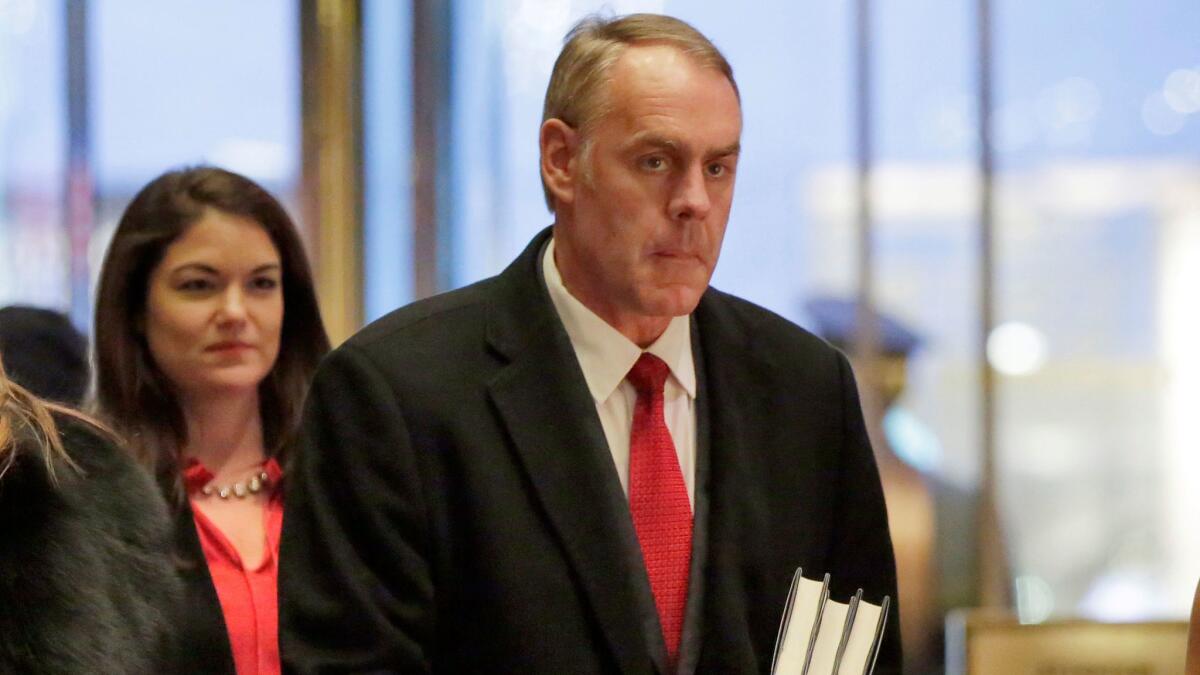Ryan Zinke was confirmed with less rancor than other Trump picks, but where he’ll take Interior Department isn’t clear

- Share via
Ryan Zinke, a Republican congressman from Montana who has questioned climate science and expressed support for expanding mining and oil and gas development on public land, was confirmed Wednesday as the new Interior secretary.
Although the 68 to 31 vote might seem close compared with the days when Cabinet nominees typically sailed through the Senate, Zinke won the votes of 16 of the chamber’s Democrats and his confirmation, unlike that of some of President Trump’s other nominees, was never in serious doubt.
The same cannot be said for exactly what direction Zinke intends to take a sprawling department of 70,000 employees who oversee about 75% of all federal public land, most of it in the West. The agency includes the National Park Service, the U.S. Geological Survey, the Bureau of Reclamation and the Bureau of Indian Affairs.
Many environmental groups have criticized his selection, though in more muted terms than they have used for the president’s other high-profile environmental nominee, Scott Pruitt, the former Oklahoma attorney general who won only two Democratic votes in his confirmation last month to lead the Environmental Protection Agency.
“Both are my clients,” Fred Davis, a Republican strategist, wrote in response to emailed questions on Wednesday. “Love ’em both, but apples and oranges. No comparison in background.”
Pruitt as attorney general brought a wave of legal challenges against the agency he now leads. Zinke, a former Navy SEAL, has frequently referred to himself as a “Teddy Roosevelt” Republican and conservationist who favors putting public lands to “multiple use” — hiking, hunting and other forms of recreation as well as fossil fuel extraction.
He has written with reverence of growing up amid the rivers and mountains of his native Whitefish, Mont., and of completing a Boy Scout Eagle project that steered him toward “a lifetime of conservation values.”
He has said that he “absolutely” opposes the sale or transfer of public land and that he intends to address what he said was a $12-billion maintenance backlog in national parks — positions that have earned him cautious praise from conservationists and Democrats.
But environmental groups have criticized him on other positions he laid out at his confirmation hearing in January before the Senate Energy and Natural Resources Committee. He testified that he would be willing to revisit several decisions by the Obama administration, including its moves to halt coal leasing, ban oil and gas drilling in most of the Arctic and use the Antiquities Act to set aside parts of the West as national monuments.
He said he would like to meet with Utah officials about Obama’s decision late last year to create the 1.35-million-acre Bears Ears National Monument, an area of ancestral tribal lands in the state’s southeast corner.
His views on climate change have been elusive and sometimes muddled.
Zinke was among hundreds of state lawmakers who signed a letter in 2010 saying climate change was a dangerous threat that needed to be addressed with a new energy policy focused on renewable energy sources.
At his confirmation hearing, however, Zinke demurred when asked whether he still believed those things, saying he was “not an expert in this field.”
He also testified that climate change is real and that humans play a role in causing it, but that there is debate on how much influence they have had and what can be done to address the problem.
An overwhelming majority of scientists say humans are the primary cause of climate change and that the use of fossil fuels must be drastically reduced to avoid catastrophic changes in the coming decades.
One factor in Zinke’s confirmation has little to do with his environmental views.
Before Trump selected Zinke, Senate Republicans had hoped to recruit him to challenge Senator John Tester of Montana, a Democrat, in 2018. A victory could strengthen Republicans’ slim majority, though it was also expected to be a bitter and potentially unsuccessful effort. Zinke’s appetite for it was unclear.
On Wednesday, Tester was among the Democrats who voted for Zinke.
“I know he’ll make us proud,” Tester wrote on Twitter.
ALSO
Red America and blue America saw two very different Trump speeches
This anarchist and ‘anti-fascist’ activist is using facts to go after the far-right fringe
Trump lays out ambitious plans for healthcare and immigration in a disciplined speech to Congress
More to Read
Sign up for Essential California
The most important California stories and recommendations in your inbox every morning.
You may occasionally receive promotional content from the Los Angeles Times.














